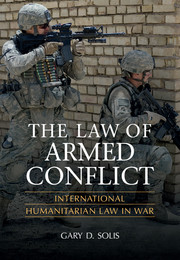Book contents
- Frontmatter
- Contents
- Table of Cases
- Table of Treaties
- Foreword
- Preface
- Acknowledgments
- LAW OF ARMED CONFLICT: INTERNATIONAL HUMANITARIAN LAW IN WAR
- 1 Rules of War, Laws of War
- 2 Codes, Conventions, Declarations, and Regulations
- 3 Two World Wars and Their Law of Armed Conflict Results
- 4 Protocols and Politics
- LAW OF ARMED CONFLICT AND INTERNATIONAL HUMANITARIAN LAW: A FRAMEWORK
- LAW OF ARMED CONFLICT AND INTERNATIONAL HUMANITARIAN LAW: BATTLEFIELD ISSUES
- References
- Index
- References
2 - Codes, Conventions, Declarations, and Regulations
from LAW OF ARMED CONFLICT: INTERNATIONAL HUMANITARIAN LAW IN WAR
- Frontmatter
- Contents
- Table of Cases
- Table of Treaties
- Foreword
- Preface
- Acknowledgments
- LAW OF ARMED CONFLICT: INTERNATIONAL HUMANITARIAN LAW IN WAR
- 1 Rules of War, Laws of War
- 2 Codes, Conventions, Declarations, and Regulations
- 3 Two World Wars and Their Law of Armed Conflict Results
- 4 Protocols and Politics
- LAW OF ARMED CONFLICT AND INTERNATIONAL HUMANITARIAN LAW: A FRAMEWORK
- LAW OF ARMED CONFLICT AND INTERNATIONAL HUMANITARIAN LAW: BATTLEFIELD ISSUES
- References
- Index
- References
Summary
Introduction
The first of two foundational questions in the study of the law of armed conflict and international humanitarian law is: What is the conflict status? What law of war applies to the armed conflict being examined? In this chapter, we examine the beginnings of the modern laws of war, an understanding of which is necessary to answer this first foundational question. Where and when did the law of armed conflict, as we know it today, arise? Who was instrumental in its founding? What documentary history may we look to?
A Basic Rule of Warfare
The most basic rule of warfare is stated in the Armed Forces' guide to conduct in war, The Law of Land Warfare: “The right of belligerents to adopt means of injuring the enemy is not unlimited.” Just because an army has the means to defeat an adversary does not necessarily indicate that it may use that weapon or means to do so. The British law of war manual adds, “There are compelling dictates of humanity, morality, and civilization to be taken into account.” Accordingly, poison gas is outlawed as a means of warfare, despite its battlefield effectiveness. Blinding lasers, biological weapons, and hollow-point bullets are prohibited. They may be effective in a military sense, but their effects are so horrific that their use in combat is prohibited. They increase suffering without bringing military advantage.
- Type
- Chapter
- Information
- The Law of Armed ConflictInternational Humanitarian Law in War, pp. 38 - 72Publisher: Cambridge University PressPrint publication year: 2010



